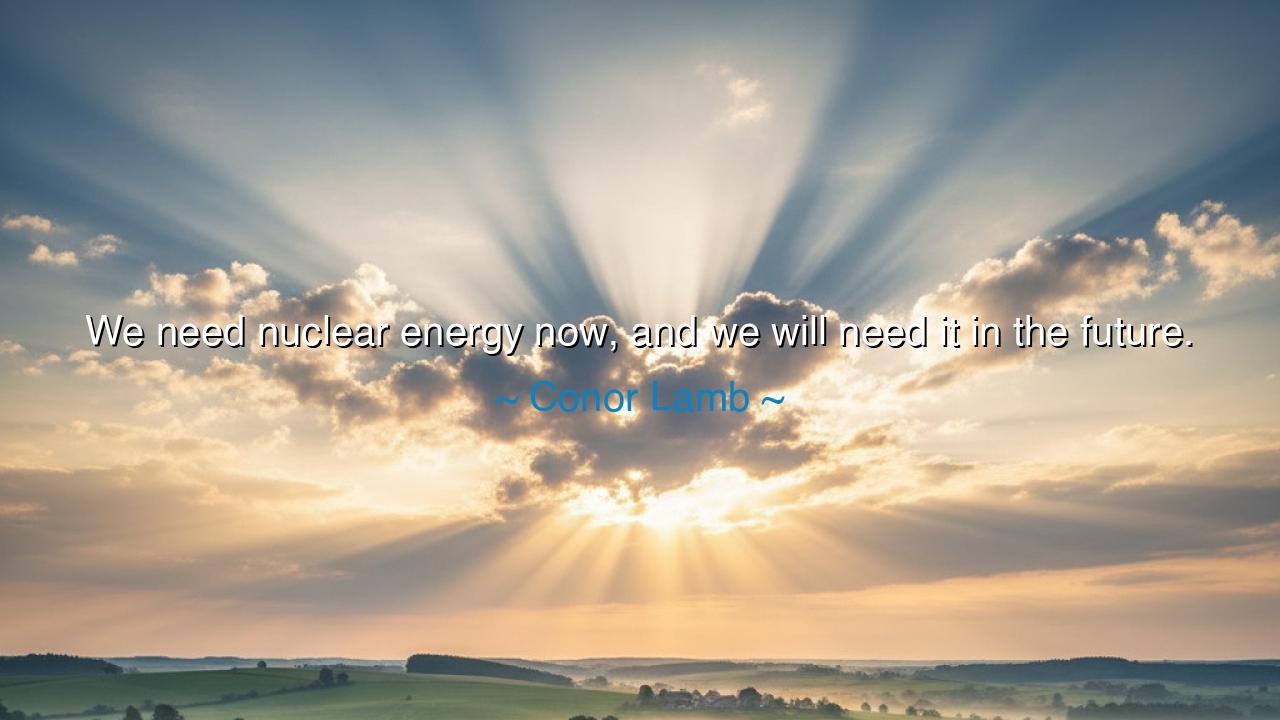
We need nuclear energy now, and we will need it in the future.






In the annals of human progress, there are moments when the discovery of a new force—a powerful and sometimes dangerous energy—becomes the key to unlocking the future. Conor Lamb’s words, "We need nuclear energy now, and we will need it in the future," speak to the timeless quest for mastery over nature, a pursuit that has been at the heart of human innovation since the dawn of civilization. Just as fire, once harnessed by the earliest humans, became a tool of transformation, so too does nuclear energy hold the potential to shape the world in ways both profound and unsettling. Yet, in the hands of the wise, such a force can provide the power needed to fuel our future and meet the challenges of a world that is rapidly changing.
In the ancient world, humans were driven by the desire to understand and control the forces of nature. Prometheus, the Titan, stole fire from the gods and gave it to humanity, forever altering the course of civilization. But this gift, while transformative, was also fraught with danger. The Greeks knew that the mastery of fire came with a responsibility to use it wisely, for it could warm the hearths of the home or burn down entire cities. In much the same way, nuclear energy is a gift that can be used to power the world, but it carries with it the responsibility to ensure its safe and sustainable use. Lamb’s call for nuclear energy, both now and in the future, recognizes that this is not just a tool of convenience, but a key element of our ability to sustain human life on Earth.
Consider the Roman Empire, where the mastery of engineering and architecture allowed for the construction of aqueducts, roads, and buildings that shaped the world for centuries. The Romans did not shy away from using their new technologies to expand their empire, but they also recognized the need for wisdom and foresight in their application. The famous Pantheon in Rome, with its massive concrete dome, was an engineering marvel that withstood the test of time. Just as the Romans had to balance their great innovations with careful planning, so too must we approach the use of nuclear energy—with an understanding of both its tremendous potential and the caution it demands.
The Industrial Revolution serves as another powerful example of how human beings, driven by the desire for progress, have shaped the world through the careful application of new technologies. The discovery and utilization of coal transformed society, propelling us into an era of unparalleled economic growth and technological advancement. But the consequences of this rapid industrialization—pollution, environmental degradation, and the exploitation of resources—remind us that every new force we unleash must be wielded with responsibility. The steam engine powered trains and factories, just as nuclear reactors now hold the potential to power our cities. The lesson from history is clear: with great power comes the need for great care and responsibility in its application.
Lamb’s assertion about the need for nuclear energy now and in the future acknowledges the challenges we face as a species. The world’s demand for energy continues to rise, driven by population growth and technological advancement. Fossil fuels, though powerful, are finite and polluting, and their continued use poses a threat to the environment and the climate. In contrast, nuclear energy offers a potential solution—one that is clean, efficient, and capable of meeting the world’s growing demand for power. Yet, like fire, nuclear energy can be both a blessing and a curse. The challenge of our time is to harness this energy in ways that are safe, sustainable, and beneficial for future generations.
History teaches us that when we discover new powers, we must learn to master them, not only for our own benefit but for the greater good. The use of nuclear energy is no different. It is a force that can transform the world, but it requires wisdom, foresight, and collaboration to ensure that it is used safely and responsibly. Chernobyl and Fukushima stand as stark reminders of the dangers of nuclear power when it is mishandled, but they also offer us the opportunity to learn, to innovate, and to improve the systems that govern its use.
The lesson that Lamb imparts is clear: nuclear energy is not just a tool of the present but a necessary force for the future. As stewards of the Earth, we must balance progress with prudence, ensuring that the gifts of science and technology are used not only for immediate gain but for the lasting benefit of all. Just as the ancients harnessed the forces of nature to build their civilizations, so too must we embrace the power of nuclear energy to build a future that is sustainable, prosperous, and peaceful. Let us, like the Romans, the Greeks, and the pioneers of the Industrial Revolution, approach this gift with the understanding that it is both a powerful tool and a great responsibility. Only through wisdom and foresight can we ensure that nuclear energy becomes a force for good rather than a danger to the generations that will follow.






AAdministratorAdministrator
Welcome, honored guests. Please leave a comment, we will respond soon